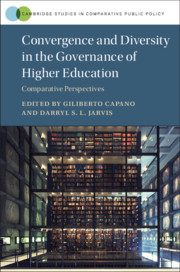Book contents
- Convergence and Diversity in the Governance of Higher Education
- Cambridge Studies in Comparative Public Policy
- Convergence and Diversity in the Governance of Higher Education
- Copyright page
- Dedication
- Contents
- Figures
- Tables
- Contributors
- Preface
- Abbreviations
- Part I Theorizing Governance in Higher Education
- 1 Theorizing the Governance of Higher Education
- Part II Systems, Processes, and Dynamics of Governance in Higher Education
- Part III Geographies of Governance
- Index
- References
1 - Theorizing the Governance of Higher Education
Beyond the ‘Republic of Scholars’ Ontology
from Part I - Theorizing Governance in Higher Education
Published online by Cambridge University Press: 21 November 2020
- Convergence and Diversity in the Governance of Higher Education
- Cambridge Studies in Comparative Public Policy
- Convergence and Diversity in the Governance of Higher Education
- Copyright page
- Dedication
- Contents
- Figures
- Tables
- Contributors
- Preface
- Abbreviations
- Part I Theorizing Governance in Higher Education
- 1 Theorizing the Governance of Higher Education
- Part II Systems, Processes, and Dynamics of Governance in Higher Education
- Part III Geographies of Governance
- Index
- References
Summary
Scholarship on higher education has been dominated by organizational and functionalist literatures, leading to a ‘republic of scholars’ ontology which has denuded the prospects for theory development or explanatory models to account for the configuration and changing patterns of higher education governance. This chapter proposes three correctives to traditional analogical frameworks. First, abandoning standpoint-guildism perspectives and adopting political economy and market segmentation lenses of inquiry. Second, abandoning methods of enquiry that situate the locus of change in higher education governance in mechanistic institutional-group processes and instead adopting frameworks that focus on the sociology of goods, their classification, and value construction as central drivers in market stratification and coextensive processes of divergence and convergence. And third, adopting more analytically rigorous conceptions of convergence and governance to overcome what we view as a false empiricism – the tendency to conflate policy labels and political rhetoric with policy instruments and governance tools to produce over-inflated images of convergent higher-education governance trajectories.
Keywords
- Type
- Chapter
- Information
- Convergence and Diversity in the Governance of Higher EducationComparative Perspectives, pp. 3 - 40Publisher: Cambridge University PressPrint publication year: 2020

